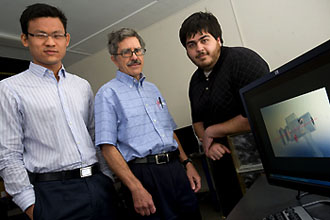Students' Vision Aids Malaria Detection
Undergraduates in the Tulane University biomedical engineering program have won a prize for a technology design that could detect malaria in the millions of people worldwide who are at risk for the disease.

Associate professor David Rice, center, is proud of his team of biomedical engineering students who won national recognition for their idea for diagnosing malaria. With Rice are students Xun “Michael” Liu, left, and Joseph Majdi, right. (Photo by Paula Burch-Celentano)
The six students tied for third place and won a $2,500 grant at the National Collegiate Inventors and Innovators Alliance BMEStart competition for their idea, a new diagnostic tool to detect malaria by examining the retina of the eye.
The competition encourages undergraduates in biomedical innovation and entrepreneurship. Students on the team Xun “Michael” Liu, Donald Campbell, Alison Douglas, John Huck, Austin Dobbins and Joseph Majdi submitted their work last May.
In some cases, malaria causes retinopathy, damage to the small blood vessels in the eye, says David Rice, associate professor of biomedical engineering, who mentored the students.
“We were looking to find color differences in the reflection of light off the retinas and this involved developing a simple way to measure the reflection of different wavelengths and a way to quantify those,” Rice says.
There are several ways used to diagnose malaria currently but all are inconvenient or expensive, he says. The students' idea uses a multi-color LED array to more easily detect retina disorders often associated with cerebral malaria.
Liu, now pursing a master's degree in biomedical engineering, says his team “wanted to do something that not only was able to detect malaria and address ease of use issues, but we also wanted to make something that was reusable and relatively cheap. The contest is for the technology itself as well as showing commercial potential. We put in market analysis, operational plans, even some basic financial projections.”
A patent has been filed for the device, which would allow for diagnosis of malaria without a clinician or microscope.
“The ability to provide this at a cost that's less than the cost of treatment [of malaria] means you can actually reduce healthcare costs,” says Rice.
Michael Celone is a sophomore student at Tulane majoring in public health.
